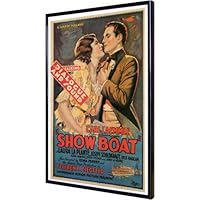
Average Reviews:

(More customer reviews)I use the term "talkie" in the loosest of terms, because very few talking passages survive. In a tragic reverse of what is the case of many dawn of sound era films, the video film elements for this movie largely remain and do so in good quality, and the talking and singing passages largely do not. For example, you can find CDs of the entire soundtrack of 1929's Gold Diggers of Broadway - minus a very little - but it is the film itself that no longer exists with the exception of two reels. We owe this to the durability of Vitaphone discs.
Notice that what looks like an "all talking" advertisement on the poster is partly blotted out by a "singing and dialogue" advertisement on top of it. That was probably because the "all" in "all talking" was not there. There is a prologue at the beginning of the film in which stars from the Ziegfeld production do numbers from the musical, and the video portion of that is lost. Then the first half of the film is largely silent with synchronized effects. The second half of the film was largely synchronized dialogue, but the audio portion has been largely lost. All that remains where there is both video and dialogue are two short scenes between romantic leads Laura LaPlante (Magnolia) and Joseph Schildkraut (Gaylord Ravenal). Notice that the film has Ms. LaPlante billed ahead of the now well-known Schildkraut. LaPlante was a big star at Universal at the time having starred in films such as "The Cat and the Canary".
This incarnation of "Show Boat" differs from the 1936 and 1951 versions in big ways. For one, a large portion of the film is devoted to the disintegration of the relationship of the Ravenal marriage after the couple leave the Show Boat. Also, Julie is only a passing figure in this film, and Captain Andy has a completely different fate than in the latter two films.
In spite of all the odd decisions - to put the musical numbers associated with Ziegfeld in as a prologue, and to make this musical a part-talkie with non-musical stars in the first place, the film made money for Universal, largely outside the big cities where people had not seen Ziegfeld's Broadway version. In short, this poster is the only artwork commemorating a film that was dated in technique a year after it was made.
Click Here to see more reviews about: Show Boat 11"x17" Framed Poster
Click here for more information about Show Boat 11"x17" Framed Poster

No comments:
Post a Comment